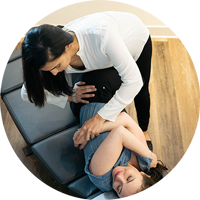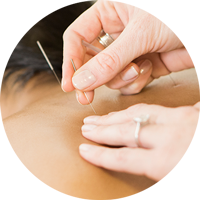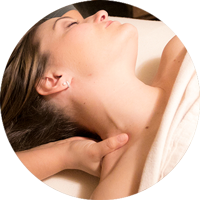Is it coincidental that May is a designated awareness month for both posture and mental health respectively?
We do know that good posture is crucial, not only for our physical health but also our emotional wellbeing. Poor posture can make us appear less confident to others. It can also make us feel less confident and even downright bad on the inside.
Forget “Perfect” Posture… Find Your Ideal Posture
First off, if you are giving yourself a hard time about perfection, it’s important to remember that the concept of “perfect posture” may vary. Every body is unique in this regard.
To help find the ideal posture for your body’s needs, resources from PostureMonth.org say three main factors play a role for everyone: awareness, control, and environment.
Awareness begins where you are. In today’s society, we tend to spend a lot of time sitting due to technology.
Your body is made to walk and run. Sitting too long can be a major source of musculoskeletal pain. Individuals who sit for prolonged periods of time (12 hours or more daily) are also at greater risk for diabetes, heart disease, and life-threatening falls.
Sitting hunched over for long periods not only hurts posture but also restricts your breathing and circulation, leading to unused muscles that can further weaken over time.
The antidote is fairly straightforward: regular exercise with controlled attention can improve your posture while also to boosting your confidence.
Posture Monthly also suggests setting a reminder for taking frequent breaks from sitting and creating time in your daily schedule for movement.
Your environment is equally important. Is your work space set up for pain or productivity? Whether you work from home or at an office, reviewing your set-up can help you prevent back, neck, shoulder, and hip pain caused by poor ergonomics. This webinar from Aligned Modern Health’s Chiropractic Physician, Dr. Marcus Steward, DC, offers helpful instructions on maximizing desk ergonomics and stretches you can easily do at home or in-office to mitigate the effects of sitting all day.
Ultimately, good posture can also make you feel better emotionally!
Imagine throwing your shoulders back, taking deep breaths, and standing tall with your head and chest high!
This can change your emotions, as studies show that mood can be influenced by body use.
A study conducted by the Department of Psychiatry at the University of Sao Paulo Medical School in Sao Paulo, Brazil, found that posture and body image in individuals with major depressive disorder could be quantified. The study concluded that poor posture results in increased head flexion, increased thoracic kyphosis, a trend toward left pelvic retroversion, and abduction of the left scapula. During remission, patient posture is similar to that of the general population.
Maintaining good posture is a simple and effective way to feel better and improve your overall health. Remember to sit strong, do not sit for too long, and add exercise into your daily routine to achieve ideal posture for your body.
For more suggestions on how to improve posture and mood, book an appointment with us!
Schedule an Appointment










